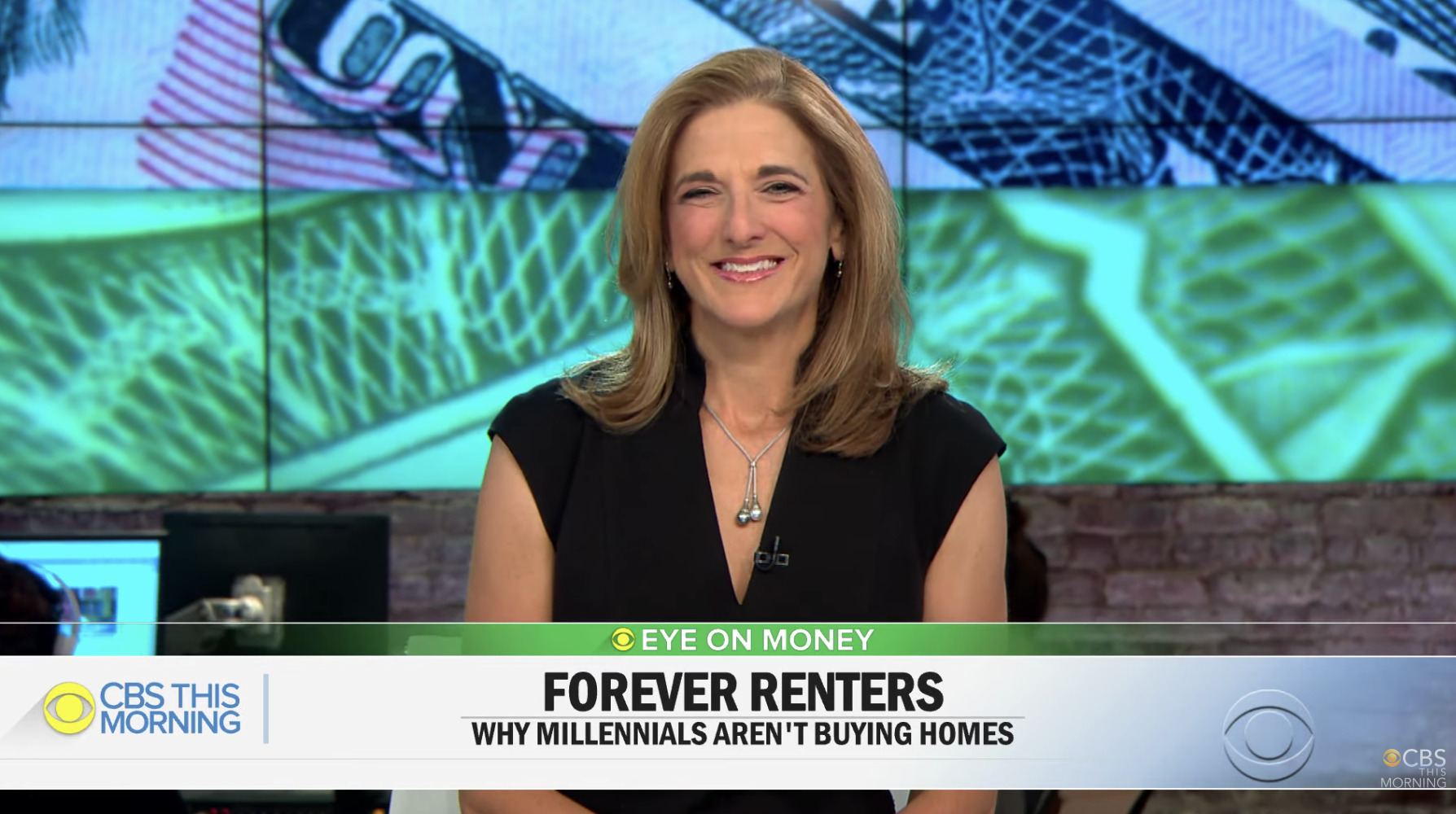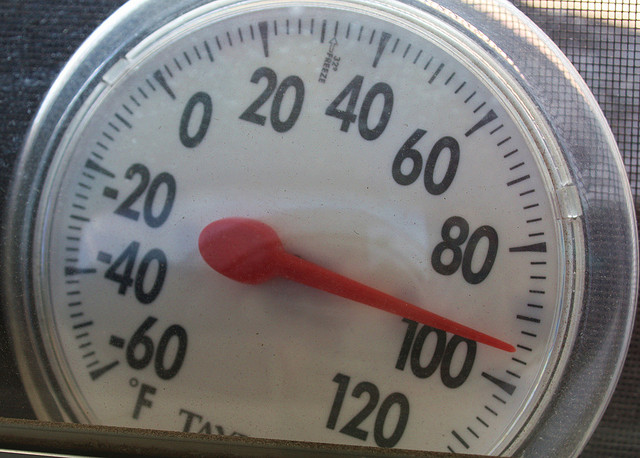Many Americans in their 20s and 30s may have given up on the dream of homeownership. Nearly half of millennial renters say they have not saved a dime for a down payment to buy a home. I joined CBS This Morning to discuss why many millennials could be permanent renters and what it means for the housing market.
Housing Set for Summer Sizzler
“The housing market is coming back and it looks like it will be with a vengeance,” according to economist Joel Naroff. He offered this commentary after a report showed that building permits, an indicator of future activity, soared to the highest pace in nearly eight years. Surging permit requests along with a jump in builder confidence, an increase in activity and a drop in mortgaged residential properties with negative equity could make the summer a strong one for the real estate market. That’s great news for patient homeowners, who have been waiting a long time for the tide to turn. As of March, the S&P/Case-Shiller U.S. National Home Price Index is up 24.7 percent from the post-bubble low set in December 2011, but still remains 7.6 percent below the peak. (In many parts of the country, like the Bay area and portions of New York, prices are above the previous peak.)
But economists are hopeful that activity and prices will continue to perk up, due to a number of factors. The most important catalyst for housing is the improving economy and employment landscape. As Americans feel more confident about the economy and more secure in their jobs, they will be more willing to take the big step of home ownership.
Additionally, mortgage rates remain low and banks are finally loosening credit conditions, both of which has drawn more buyers into the market, including a group called “Boomerang Buyers.” These are homeowners who lost their homes during the housing recession and are ready to jump back into the market.
According to real estate information company RealtyTrac, from 2007 to 2014 some 7.3 million Americans lost their homes to foreclosures or to short sales. Because both of these events can remain on your credit report for up to seven years, this year will see the first wave of return buyers to the market. RealtyTrac projects 250,000-500,000 Boomerang Buyers will come back into the market this year, and then more than a million in the subsequent few years. Presuming that there are no other major credit issues lingering, these people have a good opportunity to come out of the financial doghouse and qualify for a mortgage.
Those markets likely to see the largest influx of Boomerang Buyers materialize are those where there were a high percentage of housing units lost to foreclosure and where current home prices are still affordable for median income earners, like Phoenix, AZ, Merced and Stockton, CA and Cape Coral/Ft Myers, FL.
One last group that could help boost the market is Millennials (those aged 18 to 34). Sure, many of them are spooked by home ownership, because they watched their parents navigate the Great Recession and they are graduating college with a hefty chunk of student loans. But they may find that a fixed rate mortgage is the perfect antidote to rising rents. When they do come to that realization, the nation’s homeownership rate, which at 63.8 percent in the first quarter of 2015 is the lowest level since 1989, will reverse course.
If you are entering the market as a buyer, run the numbers and be crystal clear about what you can afford. If you are planning to get a mortgage, go to AnnualCreditReport.com and correct any errors on the report before you start the process, which will make it easier to get pre-approved.
If you are a seller, price your house reasonably. According to realtors, the first three weeks of a home’s entrance on the market are the most critical for creating interest and attracting buyers. If your initial price is too high, it may sit idly on the market. The corollary to overpricing the house is a reluctance to reduce the price. If there’s no action for three to four weeks, it’s time for a price cut.
Buying vs Renting: Which is Better?
Three years into the national housing recovery, activity and price increases are moderating. While the unusually severe weather across the country has contributed to the recent weakness, the effects of last year’s rise in mortgage rates and the incremental increase in inventory have slowed things down. As a result, it is a perfect time to consider one of the age old questions that plagues would-be homeowners and equity rich near-retirees: Should I buy or rent? Let’s start with some post-housing crash statistics. According to the Census Bureau, homeownership peaked in 2004 at 69.2. Since then, the US homeownership rate has fallen for nine consecutive years, down to 65.2 at the end of last year. Obviously the housing boom and bust and subsequent recession reversed the trend. But something else happened over the past ten years: the “dream” of homeownership was called into question by every age group.
The under 35 set watched with dismay as their parents were crushed by the housing crisis. As a result, they are spooked by homeownership, with just 36.8 percent taking the plunge. Some of them have been forced to live with their parents longer rather than forming their own households, while others are content to live the carefree life of a renter.
Meanwhile, their parents, aged 55 to 64 saw their share of household ownership at its lowest point since recordkeeping began in 1976. Where did they go? Also to the rental market, according to Harvard University’s Joint Center for Housing Studies. The number of renter households aged 55-64 grew by 80 percent between 2002 and 2012, compared to 50 percent growth among all households. As the housing recovery continues, the ranks of pre-retiree and retiree renters may continue grow, because many will seek to finally recoup home equity that could be vital during their retirement years.
The calculation of renting versus owning, like most financial decisions, is an intensely personal one. The best lesson of the past ten years is that each potential homeowner must be financially prepared. I recommend putting down at least 20 percent and having an ample emergency reserve fund to pay for the routine maintenance a home requires.
If you have squirreled away the necessary funds, the next question is whether it is better for YOU to rent or buy. On a national level, monthly mortgage payments dipped below rent payments in mid-2008 after the housing meltdown, making owning cheaper than renting. But every market is different, which is why you need to run the numbers. You can use this NYT calculator, which requires you to do some market research in order to compare the cost of renting and owning in your area.
All of these calculations have a caveat: Even if it makes financial sense for you to rent today in certain locations, if inflation picks up in the future (which it probably will), so too will your rent. That may make the rent versus buy calculation tip in the other direction over time. On the other hand, the benefit of not being tied to a house can mean the ability to grab a better job in a different city. And maybe renting in retirement can free up much-needed liquidity, which may be more valuable to you than keeping the family home.
And then there is the emotional equation. There is a blissful peace of mind that renters have, because they never worry about the boiler imploding, the roof leaking or an appliance that stops working. All of those problems are easily solved with a quick call to a landlord, who has to deal with the hassle of repairs.
While renting can instill a sense of freedom, many homeowners will tell you about the great psychic benefits of owning their own homes, of nesting and creating a "home" rather than simply a place to hang your hat for a while. All of these factors are important variables in your decision to buy versus to rent.
Image by Flickr User http://www.pallspera.com
![Jill on Money [ Archive]](http://images.squarespace-cdn.com/content/v1/59efbd48d7bdce7ee2a7d0c4/1510342916024-TI455WZNZ88VUH2XYCA6/JOM+Blue+and+White.png?format=1500w)


